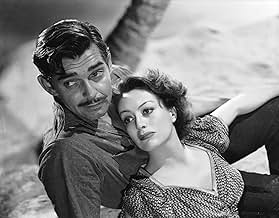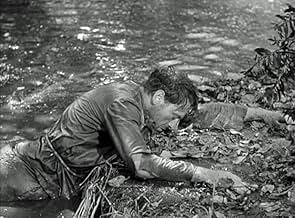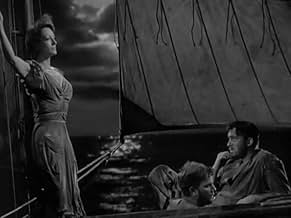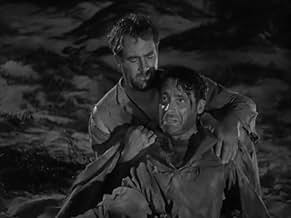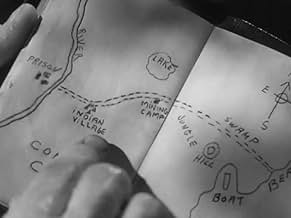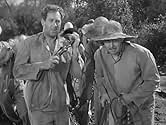NOTE IMDb
6,9/10
3,2 k
MA NOTE
Des bagnards en fuite et une fille de joie se repentent peu à peu de leur passé sous l'influence de l'un d'entre eux, un nommé Cambreau.Des bagnards en fuite et une fille de joie se repentent peu à peu de leur passé sous l'influence de l'un d'entre eux, un nommé Cambreau.Des bagnards en fuite et une fille de joie se repentent peu à peu de leur passé sous l'influence de l'un d'entre eux, un nommé Cambreau.
- Réalisation
- Scénario
- Casting principal
- Récompenses
- 2 victoires au total
Frederick Worlock
- Grideau
- (as Frederic Worlock)
Jack Adair
- Guard
- (non crédité)
Richard Alexander
- Guard
- (non crédité)
Stanley Andrews
- Constable
- (non crédité)
Betty Compson
- Suzanne
- (non crédité)
Gene Coogan
- Convict
- (non crédité)
Harry Cording
- Guard
- (non crédité)
Avis à la une
10vox-sane
A beautiful movie with a mostly A-list cast, far superior to the source novel. "Strange Cargo" has almost non-stop action, yet the central allegory is never lost in action, nor is the storyline swamped by allegory. In less capable hands it might've been a maudlin movie, but instead is a finely crafted parable where a mysterious Christ-like figure (Hunter), introduced while taking Clark Gable's place in a prisoner head-count, accompanies and guides a mixed-nut boatload of escapees from Devil's Island. He's never an intrusive or moralizing figure, nor does he employ clever wordplay or ecstatic preachments, but assists each of the escapees as each individually confronts the internal corruption that led them to Devil's Island -- and the film's makers have the courage to show some of the men dealing with that confrontation, and some turning away from it, without giving judgment to the rightness or wrongness of either choice. This movie proves the potential for making a truly solid, entertaining and non-mawkish movie on orthodox Christian themes without the foolish baggage of robes and sandals (or insipid and sermony scripts). The movie's only disappointment is that Peter Lorre is not one of the escapees but a loathsome bounty hunter who has too few scenes. His character doesn't appear in the book, but deepens the parable. Overall, "Strange Cargo" is a movie that can be enjoyed for the plot alone, but which courageously adds layers, like those of an onion, that can be savored by the discerning. It's astounding this movie hasn't become a "cult" favorite, but perhaps its tendency to prompt introspection isn't much appreciated these days.
This is one of my favorite movies from the '40s. It's such a strange film for the time. Clark Gable and some other convicts escape from a Devil's Island-type penal colony. They are joined by a convict (Ian Hunter) none of them seem to know but who has a strange way about him. Gable also brings along a prostitute (Joan Crawford) who turned him in on his last escape attempt. The convicts and Joan embark on a dangerous journey to escape the island. Along the way they begin to suspect there is something almost supernatural about Hunter's character. As a matter of fact, he is heavily implied to be Jesus Christ! This sounds like something prime for mockery but it actually works really well.
Clark Gable is just great in this, from a pure entertainment perspective. He spends the whole movie barking at people and being a tough guy. I especially love all of his scenes with Joan Crawford, saying things like "come here baby" and planting one on her. It's a macho cheesy role for Gable but I loved every minute of it. Crawford turns in an underrated performance and looks absolutely stunning. I don't think Joan would ever look this pretty on screen again. The best thing about it is she looks relatively plain here. No shoulder pads, no Groucho Marx eyebrows, no heavy makeup or matronly hairstyles. She's positively radiant.
The cast is amazing. In addition to Gable and Crawford, there's Ian Hunter's brilliantly enigmatic turn as Cambreau. Paul Lukas and Albert Dekker turn in two of the best performances of their careers. Peter Lorre plays the creepy Pig who has eyes on Joan. John Arledge is nicely sympathetic as Dekker's "friend." There's certainly some room for interpretation with that part of the movie. It's a good-looking film. Director Frank Borzage never made an ugly movie that I'm aware of. He epitomized MGM glamour. Great Franx Waxman score, too. Just a phenomenal movie. Deserves much wider recognition than it has received.
Clark Gable is just great in this, from a pure entertainment perspective. He spends the whole movie barking at people and being a tough guy. I especially love all of his scenes with Joan Crawford, saying things like "come here baby" and planting one on her. It's a macho cheesy role for Gable but I loved every minute of it. Crawford turns in an underrated performance and looks absolutely stunning. I don't think Joan would ever look this pretty on screen again. The best thing about it is she looks relatively plain here. No shoulder pads, no Groucho Marx eyebrows, no heavy makeup or matronly hairstyles. She's positively radiant.
The cast is amazing. In addition to Gable and Crawford, there's Ian Hunter's brilliantly enigmatic turn as Cambreau. Paul Lukas and Albert Dekker turn in two of the best performances of their careers. Peter Lorre plays the creepy Pig who has eyes on Joan. John Arledge is nicely sympathetic as Dekker's "friend." There's certainly some room for interpretation with that part of the movie. It's a good-looking film. Director Frank Borzage never made an ugly movie that I'm aware of. He epitomized MGM glamour. Great Franx Waxman score, too. Just a phenomenal movie. Deserves much wider recognition than it has received.
The Strange Cargo referred to in the title is in the person of Ian Hunter who is a mysterious other world convict who comes upon a group of them planning to escape from Devil's Island. It's a strange film, Strange Cargo with Clark Gable and Joan Crawford in the very last of eight films they were paired in by MGM.
Crawford dusts off her Sadie Thompson role for her character here. Even with the Code firmly in place it's rather obvious that Crawford is a working girl. She's free, but stranded on that notorious convict island. Gable is essentially the same cynical tough guy he played in so many MGM features at that time.
Ian Hunter is the mysterious stranger among them. These aren't a group of choir boys he comes among. Yet one by one as they die he brings a peace that passeth all understanding as the Good Book says. The escapees all don't die, but all but one come under his influence.
I'm surprised that TCM did choose this one for its theme this June of gays in the cinema. Prison films even during the days of the Code were a bit more open in treatment of homosexuality. The relationship of Albert Dekker and young John Arledge is rather obvious. Dekker in fact chooses a gruesome suicide rather than live without Arledge after he dies.
In fact what's really startling to me was that the heavenly figure that Ian Hunter represents neither condemns suicide or homosexuality. I'm really wondering how the censors of the day let that one slip through.
Paul Lukas has a very interesting part. He's today what we would consider a serial killer, he's married and killed many women for their money. He's cool and cynical and rejects Hunter's entreaties. When Hunter says they will never meet again, the line is loaded with implications.
Strange Cargo is a strange film. It's not bad, but could have been a lot better without code restrictions.
Crawford dusts off her Sadie Thompson role for her character here. Even with the Code firmly in place it's rather obvious that Crawford is a working girl. She's free, but stranded on that notorious convict island. Gable is essentially the same cynical tough guy he played in so many MGM features at that time.
Ian Hunter is the mysterious stranger among them. These aren't a group of choir boys he comes among. Yet one by one as they die he brings a peace that passeth all understanding as the Good Book says. The escapees all don't die, but all but one come under his influence.
I'm surprised that TCM did choose this one for its theme this June of gays in the cinema. Prison films even during the days of the Code were a bit more open in treatment of homosexuality. The relationship of Albert Dekker and young John Arledge is rather obvious. Dekker in fact chooses a gruesome suicide rather than live without Arledge after he dies.
In fact what's really startling to me was that the heavenly figure that Ian Hunter represents neither condemns suicide or homosexuality. I'm really wondering how the censors of the day let that one slip through.
Paul Lukas has a very interesting part. He's today what we would consider a serial killer, he's married and killed many women for their money. He's cool and cynical and rejects Hunter's entreaties. When Hunter says they will never meet again, the line is loaded with implications.
Strange Cargo is a strange film. It's not bad, but could have been a lot better without code restrictions.
"Strange Cargo" is a 1940 film starring Joan Crawford and Clark Gable that leaves the usual story lines behind - romantic comedy, kept woman, rags to riches - as it weaves an allegorical tale of escaping prisoners and a Christ-like figure who accompanies them. Gable is Andre Verne, a prisoner on Devil's Island who escapes with several other prisoners (Paul Lukas, Albert Dekker, Eduardo Ciannelli, J. Edward Bromberg and John Arledge). During the evening count, he's almost found missing but another man, Cambreau (Ian Hunter) replaces him in line. He then boards the boat to the mainland with them and Julie (Crawford), probably a prostitute, who is escaping also from a lecherous bounty hunter (Peter Lorre).
The prisoners fall on hard times as they escape through the woods and also while at sea when their water becomes tainted. Cambreau gives each prisoner comfort and helps them to confront the evil that brought them to Devil's Island, helping to bring them peace at last. This is not lost on Julie who sees a chance for redemption. Verne, however, isn't interested.
This is a very simple story beautifully directed by Borzage. The atmosphere of the film is dark and haunting. There is no preachiness. The sheer power of Cambreau and his sense of faith is what brings the prisoners solace. Hunter is majestic in the role. Gable is appropriately tough, and Crawford brings depth to Julie, who thought she knew what she wanted. The rest of the cast is top-notch.
"Strange Cargo" seems like a film that was made in the early '30s with its Christian parable. This was the last film that Crawford and Gable made together. Its powerful message makes this a fitting ending for a fine MGM team.
The prisoners fall on hard times as they escape through the woods and also while at sea when their water becomes tainted. Cambreau gives each prisoner comfort and helps them to confront the evil that brought them to Devil's Island, helping to bring them peace at last. This is not lost on Julie who sees a chance for redemption. Verne, however, isn't interested.
This is a very simple story beautifully directed by Borzage. The atmosphere of the film is dark and haunting. There is no preachiness. The sheer power of Cambreau and his sense of faith is what brings the prisoners solace. Hunter is majestic in the role. Gable is appropriately tough, and Crawford brings depth to Julie, who thought she knew what she wanted. The rest of the cast is top-notch.
"Strange Cargo" seems like a film that was made in the early '30s with its Christian parable. This was the last film that Crawford and Gable made together. Its powerful message makes this a fitting ending for a fine MGM team.
This entertaining conflation of "Rain," "Island of Doomed Men," and "The Passing of the Third Floor Back" throws Joan Crawford and Clark Gable into a lifeboat with the incarnation of Jesus Christ, which is worth the price of the video already. Add a lovesick Peter Lorre (clearly worth ten Gables) pattering after the unreceptive Miss Crawford, who keeps calling him "Monsieur Pig," and you've got substance. Unforgettable camp of the highest order.
Le saviez-vous
- AnecdotesReceived a "Condemned" rating from the Catholic Legion of Decency for "irreverent use of Scripture" and "lustful complications." Even after the studio made the changes demanded, distribution was sharply cut by cities refusing to book it. Contemporary articles in The Hollywood Reporter noted the film was banned in Detroit. Other sources state it also was banned in Boston and Providence, Rhode Island.
- GaffesAt one point, Verne (Clark Gable) escapes by jumping out a window into the water. A short while later, on land, he pulls a out a Bible from inside his shirt to check a map printed inside. As he flips through the pages, there is no sign whatsoever that the book got wet. The unprotected Bible should have shown signs of water immersion (damp edges, soggy paper, etc.), but it appears to be perfectly dry.
- Citations
André Verne: So you outsmarted me, huh?
Julie: That's what happens, they tell me, when smart people get together. One of them winds up ahead.
- Versions alternativesThere is an Italian edition of this film on DVD, distributed by DNA Srl: "VOLTO DI DONNA (1941) + DONNE (1939) + STRANGE CARGO (1940)" (3 Films on a single DVD), re-edited with the contribution of film historian Riccardo Cusin. This version is also available for streaming on some platforms.
- ConnexionsFeatured in Captain Avenger (1980)
Meilleurs choix
Connectez-vous pour évaluer et suivre la liste de favoris afin de recevoir des recommandations personnalisées
- How long is Strange Cargo?Alimenté par Alexa
Détails
Box-office
- Budget
- 1 252 000 $US (estimé)
- Durée1 heure 53 minutes
- Couleur
- Rapport de forme
- 1.37 : 1
Contribuer à cette page
Suggérer une modification ou ajouter du contenu manquant

Lacune principale
By what name was Le cargo maudit (1940) officially released in India in English?
Répondre

